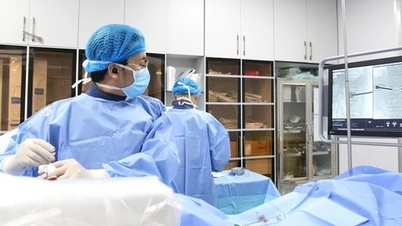Scientists have developed a new artificial intelligence tool that can predict an individual's risk of more than 1,000 diseases and forecast health changes over the next decade.

This generative AI tool was custom-designed by experts from the European Institute for Molecular Biology (EMBL), the German Cancer Research Center, and the University of Copenhagen, using algorithmic concepts similar to those used in large language models (LLMs).
This is one of the most comprehensive demonstrations to date of how generative AI can simulate human disease progression at scale, and was trained using data from two completely different health systems.
Details of the breakthrough were published in the journal Nature.
How it works
“Medical events often follow predictable patterns,” said Tomas Fitzgerald, a scientist at the European Bioinformatics Institute (EMBL-EBI). “Our AI model learns these patterns and can predict future health outcomes.”
The tool works by assessing how likely – and when – a person is to develop diseases such as cancer, diabetes, cardiovascular disease, respiratory disease and many other disorders.
Called Delphi-2M, the system looks for “medical events” in patient records, such as the time of diagnosis, along with lifestyle factors like obesity, smoking, alcohol consumption, age and gender.
It also analyzes anonymized patient record data to make predictions for the next 10 years and beyond.
Delphi-2M was trained and tested on anonymized data from 400,000 people in the UK Biobank project and 1.9 million patients in the Danish National Patient Register.
Health risks are expressed as a ratio over time, similar to a forecast of “70% chance of rain this weekend.”
Potential applications
Ewan Birney, director of EMBL, said patients could benefit from the tool in the next few years: “You walk into a clinic, the doctor is familiar with these tools and can say: 'Here are the four main health risks you might face in the future, and here are two things you can do to significantly change them.'”
In many cases, he says, the advice might be fairly straightforward—like losing weight or quitting smoking—but for some conditions, the tool could offer more specific recommendations. “That’s the future we want to create,” Birney says.
Compared to existing tools, such as Qrisk (which predicts the risk of heart attack or stroke within 10 years), the big advantage of Delphi-2M is its ability to predict all types of diseases simultaneously and over a longer time period.
“Delphi-2M predicts the prevalence of over 1,000 diseases, based on individual disease histories, with comparable accuracy to disease-specific models,” the researchers write. “The generative nature of Delphi-2M also allows for simulation of hypothetical future health scenarios, providing meaningful estimates of the potential disease burden over 20 years.”
“This is the beginning of a completely new approach to understanding human health and disease progression,” said Prof. Moritz Gerstung, Head of the Department of Cancer AI at the German Cancer Research Center. “Generative models like ours could one day help personalize healthcare and predict medical needs on a large scale.”
(According to The Guardian)
Source: https://vietnamnet.vn/delphi-2m-cong-cu-ai-moi-co-the-du-doan-nguy-co-hon-1-000-benh-o-mot-nguoi-2445508.html




![[Photo] Solemn opening of the 1st Congress of Party Delegates of Central Party Agencies](https://vphoto.vietnam.vn/thumb/1200x675/vietnam/resource/IMAGE/2025/9/24/82a89e250d4d43cbb6fcb312f21c5dd4)
![[Photo] Editor-in-Chief of Nhan Dan Newspaper Le Quoc Minh received the working delegation of Pasaxon Newspaper](https://vphoto.vietnam.vn/thumb/1200x675/vietnam/resource/IMAGE/2025/9/23/da79369d8d2849318c3fe8e792f4ce16)



























































































Comment (0)